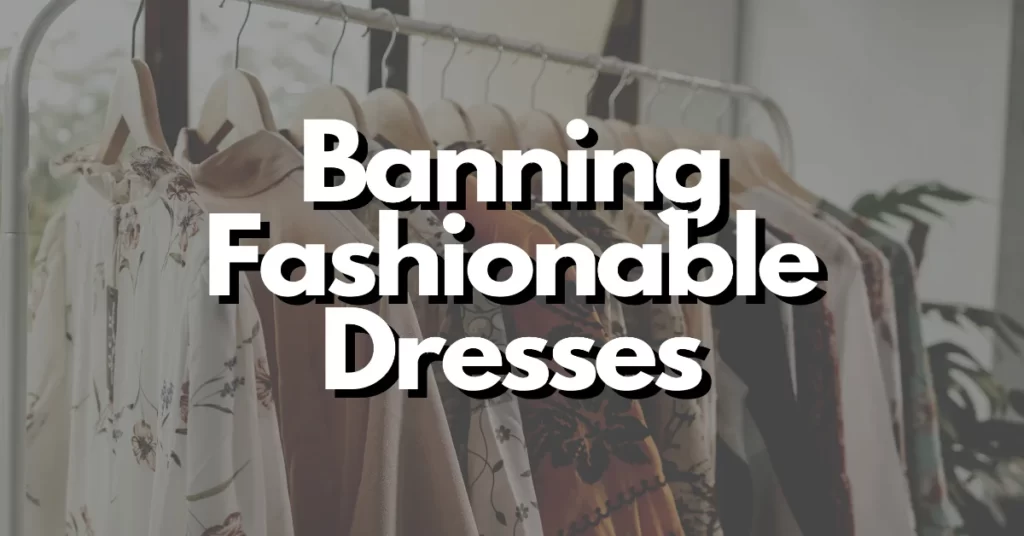Fashionable dresses have always been a topic of debate, with differing opinions on their style, appropriateness, and impact on society. Some argue that fashionable dresses empower individuals to express themselves and boost confidence, while others argue that they can perpetuate harmful beauty standards, objectify women, or promote unhealthy body image ideals.
In this blog post, we will explore the question of whether fashionable dresses should be banned, examining various perspectives, pros and cons, and the complexities of this issue.
Impact of Fashionable Dresses on Society and Culture
Fashionable dresses have always been an influential aspect of society and culture. They reflect the prevailing aesthetic values, social norms, and cultural identities of a particular time and place. Fashionable dresses can impact various aspects of society and culture, ranging from individual self-expression to gender roles, economic trends, and environmental sustainability.
Fashionable dresses can convey personal style, communicate social status, express cultural heritage, and even challenge societal norms. They can also influence consumer behavior, shape industry trends, and impact the environment through production and consumption practices.
Debating the Need for Banning Fashionable Dresses
The question of whether fashionable dresses should be banned or regulated has been a subject of debate in various contexts, such as dress codes in educational institutions, workplace attire policies, or cultural and religious considerations.
Proponents of banning fashionable dresses argue that certain styles or trends may be offensive, inappropriate, or harmful, and that regulations are needed to maintain decency, professionalism, or cultural sensitivities.
They may argue that revealing or provocative clothing can contribute to objectification, discrimination, or sexual harassment, or that certain cultural or religious norms should be respected and preserved through dress codes.
Arguments for Banning Fashionable Dresses
Supporters of banning fashionable dresses may argue that dress codes are necessary to promote professionalism, maintain order, or ensure safety in certain contexts, such as schools, workplaces, or public spaces. They may assert that dress codes can prevent distractions, uphold decorum, or foster a sense of community and identity.
They may also argue that dress codes can protect vulnerable individuals, such as children or marginalized groups, from exploitation, discrimination, or harassment. Furthermore, proponents of banning fashionable dresses may assert that dress codes can promote cultural or religious respect and prevent cultural appropriation or misappropriation.
Arguments against Banning Fashionable Dresses
Critics of banning fashionable dresses may argue that such regulations can infringe upon personal freedoms, self-expression, and individuality. They may argue that dress codes can perpetuate harmful stereotypes, reinforce gender norms, or limit diversity and inclusion.
They may assert that clothing is a form of self-expression and banning fashionable dresses can stifle creativity, autonomy, and diversity. Critics may also argue that dress codes can be subjective, arbitrary, or discriminatory, and that they may not necessarily address the underlying issues of sexism, harassment, or discrimination.
Finding a Middle Ground: Alternative Approaches to Fashionable Dresses
Instead of a binary debate of banning or not banning fashionable dresses, alternative approaches can be explored.
These may include implementing dress codes that are inclusive, transparent, and respectful of individual rights and cultural sensitivities. This can involve engaging in open dialogues, considering diverse perspectives, and finding a balance between personal expression and societal norms.
Educating individuals about the impact of clothing choices on oneself and others, promoting diversity and inclusivity in the fashion industry, and encouraging sustainable and ethical fashion practices can also be alternative approaches.
Additionally, fostering a culture of mutual respect, tolerance, and acceptance, where individuals are encouraged to express themselves while being mindful of the impact of their choices on others, can be a way to find a middle ground on the issue of fashionable dresses.
Conclusion
In conclusion, the question of whether fashionable dresses should be banned is complex and subjective, with valid arguments on both sides. While fashionable dresses can be a form of self-expression and confidence-building, they can also have negative impacts on body image, perpetuate harmful beauty standards, or objectify women.
Ultimately, it’s important to consider diverse perspectives, engage in constructive discussions, and make informed choices based on individual values, ethics, and personal style.

